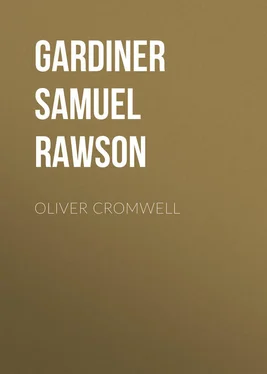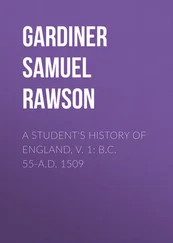Samuel Gardiner - Oliver Cromwell
Здесь есть возможность читать онлайн «Samuel Gardiner - Oliver Cromwell» — ознакомительный отрывок электронной книги совершенно бесплатно, а после прочтения отрывка купить полную версию. В некоторых случаях можно слушать аудио, скачать через торрент в формате fb2 и присутствует краткое содержание. Жанр: foreign_antique, foreign_prose, на английском языке. Описание произведения, (предисловие) а так же отзывы посетителей доступны на портале библиотеки ЛибКат.
- Название:Oliver Cromwell
- Автор:
- Жанр:
- Год:неизвестен
- ISBN:нет данных
- Рейтинг книги:3 / 5. Голосов: 1
-
Избранное:Добавить в избранное
- Отзывы:
-
Ваша оценка:
- 60
- 1
- 2
- 3
- 4
- 5
Oliver Cromwell: краткое содержание, описание и аннотация
Предлагаем к чтению аннотацию, описание, краткое содержание или предисловие (зависит от того, что написал сам автор книги «Oliver Cromwell»). Если вы не нашли необходимую информацию о книге — напишите в комментариях, мы постараемся отыскать её.
Oliver Cromwell — читать онлайн ознакомительный отрывок
Ниже представлен текст книги, разбитый по страницам. Система сохранения места последней прочитанной страницы, позволяет с удобством читать онлайн бесплатно книгу «Oliver Cromwell», без необходимости каждый раз заново искать на чём Вы остановились. Поставьте закладку, и сможете в любой момент перейти на страницу, на которой закончили чтение.
Интервал:
Закладка:
Sooner or later Cromwell would have to face other questions than those of military efficiency. When Pym and his supporters drew up the Grand Remonstrance, they did not contemplate the introduction of any principle of religious liberty. The Church was to be exclusively Puritan, on some plan to be settled by Parliament upon the advice of an Assembly of Divines. That Assembly met on July 1, 1643, and if it had been left to itself, would probably have recommended the adoption of some non-episcopalian system of Church-government; whilst Parliament, faithful to the traditions of English governments, would have taken care that the clergy should be placed under some form of lay government emanating from Parliament itself. In the summer of 1643 it was impossible to separate questions of ecclesiastical organisation from those arising out of the political necessities of the hour. It was known that Charles was angling for the support of Ireland and Scotland, and if Parliament was not to be overborne, it was necessary to meet him on the same ground. In Ireland Charles was fairly successful. On September 15 his Lord Lieutenant obtained from the Confederate Catholics, who were in arms against his Government, a cessation of hostilities, which would enable him to divert a portion of his own troops to the defence of the King's cause in England; ultimately, as he hoped, to be followed by an army levied amongst the Irish Catholics. Charles's attempt to win Scotland to his side was less successful. The predominant party at Edinburgh was that led by the Marquis of Argyle, who had climbed to power with the help of the Presbyterian organisation of the Church, and who justly calculated that, if Charles gained his ends in England, the weight of his victorious sword would be thrown into the balance of the party led by the Duke of Hamilton. That party however, embracing as it did the bulk of the Scottish nobility, would not only have made short work of Argyle's political dictatorship, but would have taken good care that the Presbyterian clergy should, in some way or other, be reduced to dependence on the laity. When, therefore, English Parliamentary Commissioners arrived in Edinburgh to treat for military assistance, they were confronted by a demand that they should accept a document known as the Solemn League and Covenant, binding England to accept the full Scottish Presbyterian system with its Church Courts, claiming as by Divine right to settle all ecclesiastical matters without the interference of the lay government. It is true that this demand was somewhat veiled in the engagement to reform religion in the Church of England, 'according to the example of the best reformed Churches,' so as to bring the Churches in both nations to the nearest conjunction and uniformity. The leading English Commissioner, however, the younger Sir Henry Vane, was one of the few Englishmen who at this time championed a system of religious liberty, and he now succeeded in keeping a door open by proposing the addition of a few words, declaring that religion was to be reformed in England according to the Word of God, as well as by the example of the best reformed Churches. In this form the Covenant was brought back to Westminster, and in this form it was sworn to by the members of Parliament, and required to be sworn to by all Englishmen above the age of eighteen. Few indeed amongst the members of Parliament willingly placed their necks under the yoke. It was the price paid for Scottish armed assistance, simply because that assistance could be had on no other terms. The alliance with the Scots was the last work of Pym, who died before the Scottish army, the aid of which he had so dearly purchased, crossed the Borders into England.
There were two ways of opposing the Scottish system of Divine-right Presbyterianism, the old one of the Tudor and Stuart Kings, placing the Church under lay control; and the new one, proclaiming the right of individuals to religious liberty, which was advocated by Vane, and was in the course of the next few months advocated by a handful of Independent ministers in the Assembly of divines, and by writers like Roger Williams and Henry Robinson in the press. Like all new doctrines, it made its way slowly, and for long appeared to the great majority of Englishmen to be redolent of anarchy. The freedom from restraint which every revolution brings, together with the habit of looking to the Bible as verbally inspired, had led to the growth of sects upholding doctrines, some of which gave rational offence to men of cultivated intelligence and encouraged them to look for a remedy to the repressive action of the State. On the other hand, a small number of men, most of them attached to the Independent or Baptist bodies, fully accepted the principle of religious liberty, at least within the bounds of Puritanism. For the present the question was merely Parliamentary; but it might easily be brought within the sphere of military influence, and it was not without significance that, though Essex and Waller, who had comparatively failed as generals, were on the side of Presbyterian repression, Cromwell, who had shown himself to be the most successful soldier in England, declared himself on the side of liberty. In the sectarian sense indeed, Cromwell never attached himself to the Independent or to any other religious body. In firm adherence to the great doctrine of toleration, which spread abroad from the Independents or from the Baptists, who were but Independents with a special doctrine added to their tenets, Cromwell was the foremost Independent of the day.
Not that Cromwell indeed reached his conclusions as did Roger Williams, by the light of pure reason. The rites prescribed in the Prayer Book were to him a mockery of God. On January 10, 1644, he ordered a clergyman, who persisted in using the old service in Ely Cathedral, to leave off his fooling and come down from his place. But he had no liking for the Covenant, and avoided committing himself to it till the beginning of February, 1644, when he swore to it on his appointment as Lieutenant-General in Manchester's army, doubtless laying special stress in his own mind on the loop-hole offered by Vane's amendment. The cause of religious liberty appealed to him on practical grounds. How was he to fight the enemy, unless he could choose his officers for their military efficiency, and not for their Presbyterian opinions? The Major-General of Manchester's army – Crawford, a Scot of the narrowest Presbyterian type – had objected to the promotion of an officer named Packer, who was an Anabaptist. "Admit he be," wrote Cromwell in reply, "shall that render him incapable to serve the public?.. Sir, the State in choosing men to serve it takes no notice of their opinions. If they be willing faithfully to serve it – that satisfies. Take heed of being sharp, or too easily sharpened by others, against those to whom you can object little but that they square not with you in every opinion concerning matters of religion."
It might be that religious liberty would in the long run suffer more than it would gain from military support, just as the principles of Andrewes and Laud suffered more than they gained by the support of Charles. Already the regiments under Cromwell's command swarmed with enthusiasts who spent their leisure in preaching and arguing on the most abstruse points of divinity, agreeing in nothing except that argument was to be met by argument alone. Their iron discipline and their devotion to the cause permitted a freedom which would have been a mere dissolvent of armies enlisted after a more worldly system. As Cromwell stepped more pronouncedly to the front, his advocacy of religious liberty would become well-nigh irresistible.
On January 19, 1644, the Scottish army, under the Earl of Leven, crossed the Tweed. Newcastle was pushed back into York, where he was besieged by the combined forces of Leven and the Fairfaxes. On May 6 Lincoln, which had been regained by the Royalists, was retaken by Manchester, who together with Cromwell pushed on to join in the siege of York. Rupert, however, having been sent northward by Charles, succeeded in raising the siege; and on July 2 a battle was fought on Marston Moor, in which the Royalist army, successful at first, was utterly crushed by Cromwell's skill. Having routed Rupert's horse, he drew bridle and hurried back to the assistance of the Scottish infantry, which was holding its own against overwhelming numbers of the enemy. The King's regiments of foot were routed or destroyed by his impetuous charge. Cromwell had redeemed the day after the three generals, Leven, Manchester and the elder Fairfax, had fled from that which they deemed to be a complete disaster. Before long the whole of the North of England, save a few outlying fortresses, was lost to the King.
Читать дальшеИнтервал:
Закладка:
Похожие книги на «Oliver Cromwell»
Представляем Вашему вниманию похожие книги на «Oliver Cromwell» списком для выбора. Мы отобрали схожую по названию и смыслу литературу в надежде предоставить читателям больше вариантов отыскать новые, интересные, ещё непрочитанные произведения.
Обсуждение, отзывы о книге «Oliver Cromwell» и просто собственные мнения читателей. Оставьте ваши комментарии, напишите, что Вы думаете о произведении, его смысле или главных героях. Укажите что конкретно понравилось, а что нет, и почему Вы так считаете.












